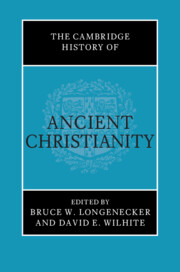Book contents
- The Cambridge History of Ancient Christianity
- The Cambridge History of Ancient Christianity
- Copyright page
- Contents
- Figures
- List of Contributors
- Editors’ Preface
- Part I Contested Contexts
- 1 The History of Ancient Christian History
- 2 The Present and Future of Ancient Christian History
- 3 Depicting the Other in Early Christian Polemic
- 4 Why Did People Become Christians in the Pre-Constantinian World?
- Part II Contested Figures
- Part III Contested Heritage
- Part IV Contested Cultures
- Part V Contested Beliefs
- Part VI Contested Bodies
- Ancient Sources
- Modern Authors
- References
2 - The Present and Future of Ancient Christian History
from Part I - Contested Contexts
Published online by Cambridge University Press: 23 August 2023
- The Cambridge History of Ancient Christianity
- The Cambridge History of Ancient Christianity
- Copyright page
- Contents
- Figures
- List of Contributors
- Editors’ Preface
- Part I Contested Contexts
- 1 The History of Ancient Christian History
- 2 The Present and Future of Ancient Christian History
- 3 Depicting the Other in Early Christian Polemic
- 4 Why Did People Become Christians in the Pre-Constantinian World?
- Part II Contested Figures
- Part III Contested Heritage
- Part IV Contested Cultures
- Part V Contested Beliefs
- Part VI Contested Bodies
- Ancient Sources
- Modern Authors
- References
Summary
The discipline of ancient Christian history is shifting, like tectonic plates with pressure building in some areas while new landscapes are emerging in others. The metaphor of “shifting frontiers” will be a familiar one to scholars in this field. The Society for Late Antiquity was formed in the wake of a 1995 conference entitled “Shifting Frontiers in Late Antiquity,” and it continues to sponsor biennial gatherings on this theme in various iterations.1 In the published proceedings from the first conference, the organizers credit the metaphor to Peter Brown’s statement from his 1971 book, The World of Late Antiquity. Brown called for renewed focus on “the shifting and redefinition of the boundaries of the classical world after ad 200.”2 Brown’s use of this imagery roughly coincided with a number of studies devoted to the Roman limes, wherein many of the standard categories like Romanitas and “barbarian” were being reconsidered.
- Type
- Chapter
- Information
- The Cambridge History of Ancient Christianity , pp. 32 - 56Publisher: Cambridge University PressPrint publication year: 2023

